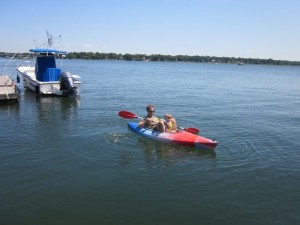Ways to offer students
choices was the theme of Session #4 of the Virtual Book Club! If you weren’t able to join us, listen to the recording here:
Virtual Book Club Feb 18th/19th and please share your thoughts on this blog:
Virtual Book Club. We have been reading and discussing
Flattening Classrooms, Engaging Minds by
Julie Lindsay and
Vicki Davis and our focus this time was Chapter
Seven (Choice) and
Chapter Eight (Creation).
We began with some great comments:
 |
| http://mrg.bz/Bo0JPI |
- @Durff shared that she tells students on 1st day that they are all intelligent (Gardner), it is her job to find out how to make them shine
- Jim shared that he believes teachers should be helping students learn, not giving them the answers
- Laurel
mentioned that some students need content delivered directly from
teachers before they are able to make choices in the classroom (and
shared an interesting book: Why Students Don't Like School?)
- Monica added that she likes to model how she learns so that students feel comfortable making mistakes in her classroom
We
also struggled with considering how teachers can create choices in the
classroom in a time of standardization and high-stakes testing (at least
in the United States).
- Paul shared that part of personalizing the classroom is establishing relationships with students - it isn't just about content, it is about connecting
- Michelle talked about the need to let teachers have choice as well - when something is working, having the freedom to pursue it, not have to stay lock-step with a scripted program
- Elena introduced the idea "of individual teachers being 'experts'
with specific tools and working collaboratively with their peers is a
more manageable and realistic approach for interdisciplinary teams."
 |
| https://saveourrhinos.wikispaces.com/ |
We
also shared our own struggles and challenges with creating and
maintaining electronic spaces for learning with choice in mind. We all
agreed that monitoring electronic spaces are difficult to maintain and
that we would love to have ongoing
eportfolios that follow students through their years of learning in a school (
Google Sites,
KidBlog,
Evernote,
Weebly and even
PhotoStory
were shared as ideas). We debated a bit about how to choose new tools -
what is trendy, and what is trendy with a purpose? Paul raised a great
point about
involving students in planning electronic spaces and
many shared stories about ways they've done this. As part of this, we
also wondered how to make sure more students have access to technology
beyond the classroom.
From there, we talked about how to structure
learning experience that offer students ways to make meaning. Rocky
shared the idea of students meeting with teachers to create useful
materials for them and Robyn shared a bit about a project her students
are doing to
save rhinos!
Interestingly, we found we have less experience offering students
chances to invent or build. It would be fun to talk more about how we
could build these concepts into our teaching more.
We ended by
trying out the break-out room feature in Blackboard Collaborate. I guess
I modeled the idea of the "teacher" not being perfect but willing to
take risks since I had no idea how it would work! :) Thanks to everyone
who was there for humoring me and experimenting along with me. I think
we'll try these small groups again next time with a focus question. Big
virtual hugs to @Durff for telling me more about how to use this
effectively at future sessions. And my apologies for those of you
listening to the recording since there will be a long pause when you are
listening (another important aspect of this tool for me to
understand!).
Thank you again for everyone that participated. I'm reminded of the quote by C. S. Lewis cited on page 34 of this book:
The next best thing to being wise oneself is to live in a circle of those who are.
Thank
you for being in my circle and adding to my wisdom! And to Mara for
agreeing to co-moderate. If anyone is interested in co-moderating next
time, please leave a comment or send me an email, I'd love your help!
Our next meeting will be
Monday, March 4th at 7:30pm EST (that’s Tuesday, March 5th at 12:30am GMT). For your time zone, click
here.
We will be discussing Chapters Nine and Ten - Celebrating, Designing,
and Managing Global Collaborative Projects. Hope to “see” you there!
 I
can't believe it is our final session. This Virtual Book Club has been a
wonderful space to connect with educators from all levels that are
passionate about their work, are life-long learners, and are willing to
share all they know as well as question what they are still learning
about.
I
can't believe it is our final session. This Virtual Book Club has been a
wonderful space to connect with educators from all levels that are
passionate about their work, are life-long learners, and are willing to
share all they know as well as question what they are still learning
about.






